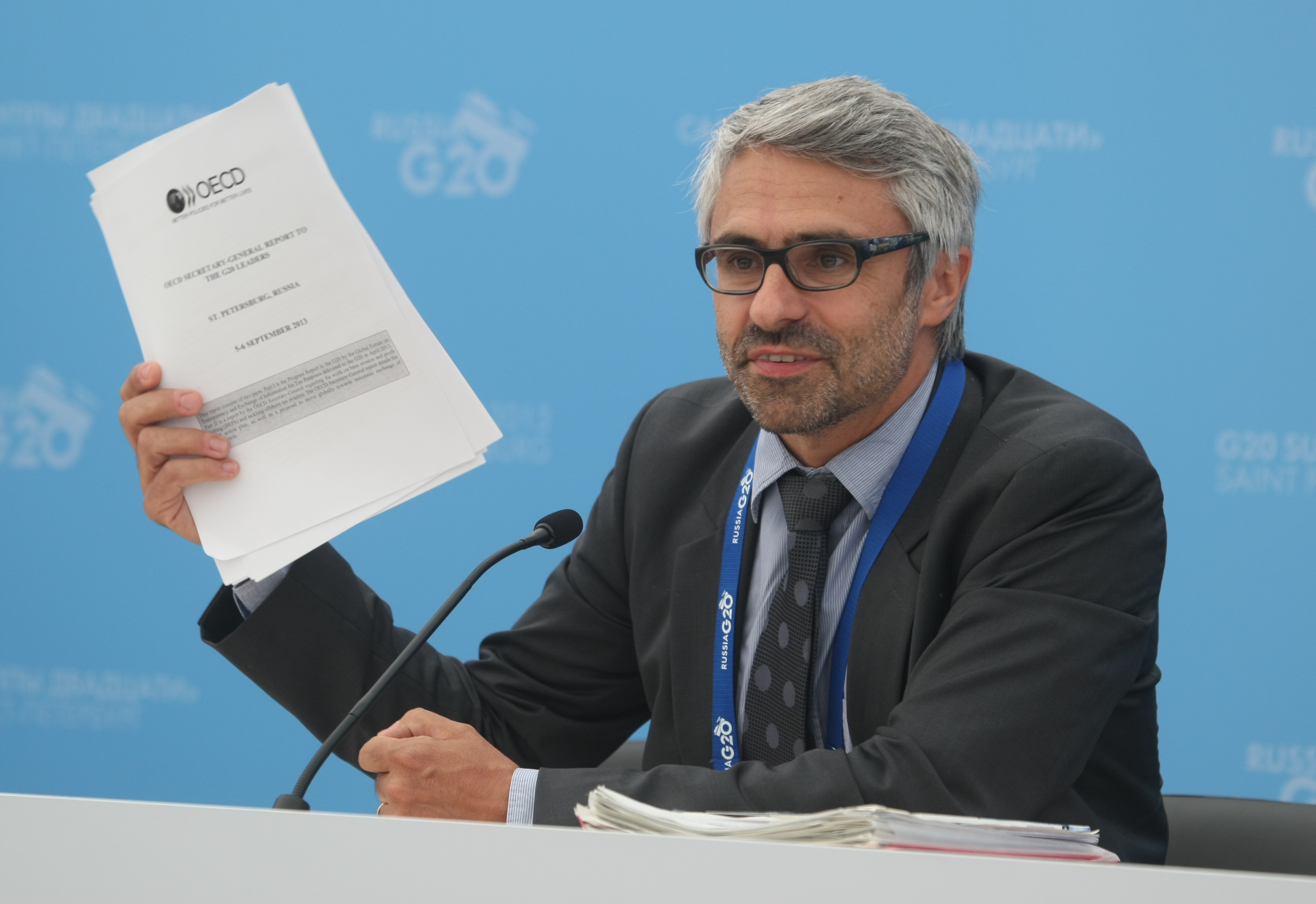OECD seeks inspiration from FATCA model

A new standard of exchanging information on tax is expected to be introduced in countries belonging to the Organisation for Economic Co-operation and Development (OECD). Switzerland will probably have to change its laws to comply with it.
The new system will probably by based on US anti-tax evasion legislation known as FATCA – the Foreign Account Tax Compliance Act, according to Pascal Saint-Amans, director of the OECD’s Centre for Tax Policy and Administration.
Saint-Amans spoke to swissinfo.ch about the plans to introduce automatic exchange of tax information which the OECD intends to present for scrutiny next February.
This future international standard is considered to be much more exacting than the current model and incompatible with the present system in Switzerland. The OECD aims to get the new standard adopted in September 2014.
Saint-Amans looks back at the recent Global Forum on Transparency and Exchange of Information for Tax Purposes held in Jakarta in November, where Switzerland was ranked alongside countries whose legislation is not up to the current OECD standard – on-demand exchange of information.
swissinfo.ch: What is your view on Switzerland, which has not yet moved into phase two of the OECD evaluation process (see infobox)?
Pascal Saint-Amans: Switzerland is currently getting rid of the last elements of its past, which dragged on rather too long due to its internal system and an almost existential attachment to banking secrecy. Switzerland is going through a difficult situation where changes are happening. But as they have still not been turned into concrete action this does not yet mean a better evaluation.
When it comes to fiscal cooperation, Switzerland remains in the category of states where legislation is not in line with the current Organisation for Economic Cooperation and Development [OECD] standard, the exchange of information on demand. Other countries in this group include Botswana, Brunei and Panama.
In order to move into phase two, Switzerland must continue the revision of its law governing international administrative assistance with regard to tax matters. A first revision, which came into force on February 1, allows for grouped assistance requests.
A further modification, which should be dealt with during the current parliamentary session, will give the possibility that in urgent cases foreign clients will only be informed after the fact that details concerning their account have been delivered to a third party country. Under the law as it stands, people who are subject to a request for administrative assistance must be informed in advance.
The Swiss government is due to soon handover a final revised proposal to parliament. The modification concerns the holder of bearer shares, who in future will no longer be able to stay anonymous. Parliament is due to examine this in spring 2014.
swissinfo.ch: The Swiss government hopes to join phase two next autumn…
P. S-A. : We very much hope so.
swissinfo.ch: The OECD is preparing to introduce a new standard which will be a reference in terms of automatic exchange of tax information. What is this standard all about?
P. S-A. : A standard is a collection of rules which have moral constraints for those signing up to them, and which indicate what a country should do. The reality will be that for the automatic exchange of information rules should cover what kind of information is to be exchanged, how often, who should collect the information, to whom it should be sent, and in what format.
Of the 50 countries that are subject to the phase two examination, 18, including France, have been judged to have conformed to the principles of fiscal transparency as laid out by the Forum. Many, including Germany, are “mostly conforming” with the rules. Austria and Turkey “partially conform”, while four countries, Cyprus, Luxembourg, the Seychelles and the Virgin Islands “do not conform” as they have rules on paper which are not applied in reality.
This phase two test focuses on cooperation between fiscal authorities. It looks at how easy it is for competent authorities to identify the real beneficiaries of investments (the knottiest point), the existence of up-to-date accounting and how easy it is for a foreign fiscal authority to receive data within a reasonable timeframe.
Source :AFP
swissinfo.ch: Who actually decides the content of the new standard?
P. S-A. : Let’s remember that a certain number of important states have pushed for automatic exchange of tax information to be put in place. The G20 supported this change by asking the OECD to work out a standard. That is now happening in a working group where all OECD members are represented, including Switzerland. The member countries are in touch with the secretariat too.
We are also consulting with the business community and the banking industry in order to make sure that the standard is practical and as low-cost as possible for the operating parties. We will go forward with two stages in mind. In February 2014 we will unveil the details pertaining to the collection of information. Later, in June, there will be more technical detail – the formats and the software to put in place. The standard will be adopted in September 2014 and presented to the G20 finance ministers who will be meeting in Australia.
swissinfo.ch: Where does the OECD look for templates or ideas for the standard? Is FATCA, the agreement that the USA proposes or imposes on its partners, an inspiration for you?
P. S-A. : The answer to that is yes. It will be a sort of multilateral form of the American FATCA agreement.
swissinfo.ch: But some states do not have a very high opinion of FATCA.
P. S-A. : The beauty of international organisations is that we oversee relations between nations and the differences between states. We will try to ensure that this initiative to make FATCA multilateral is concluded on the basis of reciprocity so that each country’s interests are taken into account. Obviously, some countries will give more information than they receive, that is the nature of the world we live in.
swissinfo.ch: Some states worry about the complexity and the financial burden of automatic exchange of information.
P. S-A. : Sure, there will be a cost associated with it, and it’s important to neither over- nor underestimate it. We will try to reduce costs as much as we can while keeping to one standard. We could have had a situation where the European Union kept to one standard, while the US kept to FATCA and India had its own standard, etc. What we are doing is to develop a single standard that will be compatible with national and regional systems – there will be only one way of collecting and exchanging information. That will cost something, but it is the price to pay to be free from suspicion of complicity in fiscal fraud.
swissinfo.ch: The OECD has been giving marks to certain states regarding the current system – on-demand exchange of information. What is the idea behind that?
P. S-A. : In 2009 each country from around the world undertook to apply this standard. The Global Forum on Transparency and Exchange of Information for Tax Purposes held in November in Jakarta was supposed to examine commitment by states to verifiable changes and actions. The idea of making those results public was to identify the countries that have not followed the rules of the game or that are not advancing quickly enough. Four countries [Luxembourg, Cyprus, Seychelles and the Virgin Islands] have been held to be not conforming to the rules, and they leave themselves open to a reputational risk.
swissinfo.ch: The OECD’s critics will say that you are better off as a large country with a fiscally attractive enclave – such as the US with Delaware, or China with Hong Kong and Macao for example – than as a small country with banking secrecy…
P. S-A. : Hong Kong and Macao are subject to separate, but very detailed examinations. As for the US, the country was not judged as “totally conforming,” but only “mostly conforming” with a large part of the objections pertaining to the state of Delaware. In the Global Forum all 120 members are on an equal footing. If Switzerland isn’t happy with the US assessment, it can make a formal objection.
(Translated from French by Victoria Morgan)

In compliance with the JTI standards
More: SWI swissinfo.ch certified by the Journalism Trust Initiative












You can find an overview of ongoing debates with our journalists here . Please join us!
If you want to start a conversation about a topic raised in this article or want to report factual errors, email us at english@swissinfo.ch.